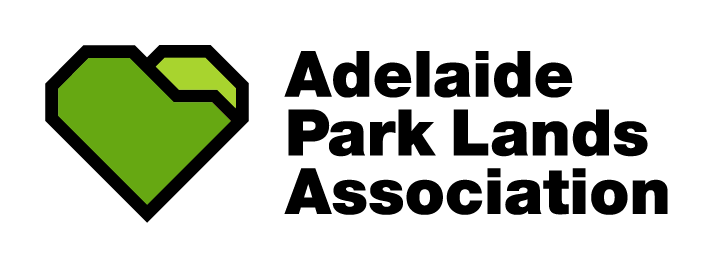If you Love your Park Lands you can't help but acknowledge and respect this land's traditional custodians; the Kaurna people who cared for the land for many thousands of years before European settlers arrived here in the 1830s.
APA joined with the Graham F Smith Peace Foundation on Sunday 3 July to get a Kaurna perspective on your Park Lands, from elder Rod O'Brien.
Walking past a giant Moreton Bay fig tree near Pinky Flat in Tarntanya Wama (Park 26)
You can take the Adelaide Kaurna Heritage Walk at any time with an on-line map and trail guide.
However this year, to mark the start of NAIDOC week, the Adelaide Park Lands Association collaborated with the map's producers, the Graham F Smith Peace Foundation to offer the opportunity to take the Kaurna Heritage Trail walk with Kaurna elder Rod O'Brien as a guide.
Rod O’Brien (centre) with the walking group alongside the River Torrens / Karrawirra Pari in Helen Mayo Park (Park 27)
Starting at a Kaurna reconciliation sculpture at the Festival Theatre, Rod took us to visit a number of art works and cultural sites near the River Torrens / Karrawirra Park, including:
Kaurna reconciliation artworks along the riverbank in Elder Park;
Reed beds and river red gums along the riverbank in Helen Mayo Park;
"Pirltawardli" meaning possum place, the site of an 1840's Kaurna school, near the Par 3 golf course shop;
Pinky Flat; (named for the 'Pingko' or bilby); and
this site (pictured below).
The Aboriginal and Torres Strait Island war memorial off Victoria Drive in Red Gum Park / Karrawirra (Park 12). The two bronze figures represent Aboriginal servicemen and women. Their prominent position on the mound is intended to convey their role as defenders of Australia and holders of a deeper knowledge about the land.
Rod O’Brien (centre) with the walking group alongside the River Torrens / Karrawirra Pari at Pinky Flat in Tarntanya Wama (Park 26)
We learned that:
cultural performances "palti" were performed for crowds at Adelaide Oval in the late 1800s;
Kaurna people taken to South Africa as trackers during the Boer War in the early 1900s were prohibited from returning to Australia because they were not recognised as citizens;
the Pinky Flat area (named for the'Pingko' or bilby) was a Kaurna camp ground long before European settlement, and for decades after settlers arrived;
a purple-coloured eel, once found in the river, is locally extinct but was recently rediscovered in the Patawalonga;
One of the stops - in Possum Park / Pirltawardli (Park 1) near the site of the 1840s missionary school. Pics: @adelaidewriter
Rod O'Brien was an entertaining host who also shared some of his own life story including his University education and his former long career working in community welfare.
It was cold, but the walking group enjoyed the sunshine here alongside the River Torrens / Karrawirra Pari in Helen Mayo Park (Park 27). Pic: @adelaidewriter
Proceeds from the walk will be going to the Graham F Smith Peace Foundation which "works for peace through the arts by supporting artists who advocate for human rights, social justice, care for the environment and Aboriginal reconciliation." The Foundation has been one of the sponsors of our Adelaide Park Lands Art Prize.
On the riverbank in Elder Park, Tarntanya Wama (Park 26)
What is NAIDOC week?
This year NAIDOC week is 3 to 10 July.
NAIDOC stands for National Aborigines and Islanders Day Observance Committee. Its origins can be traced to the emergence of Aboriginal groups in the 1920′s which sought to increase awareness in the wider community of the status and treatment of Aboriginal and Torres Strait Islander Australians.










